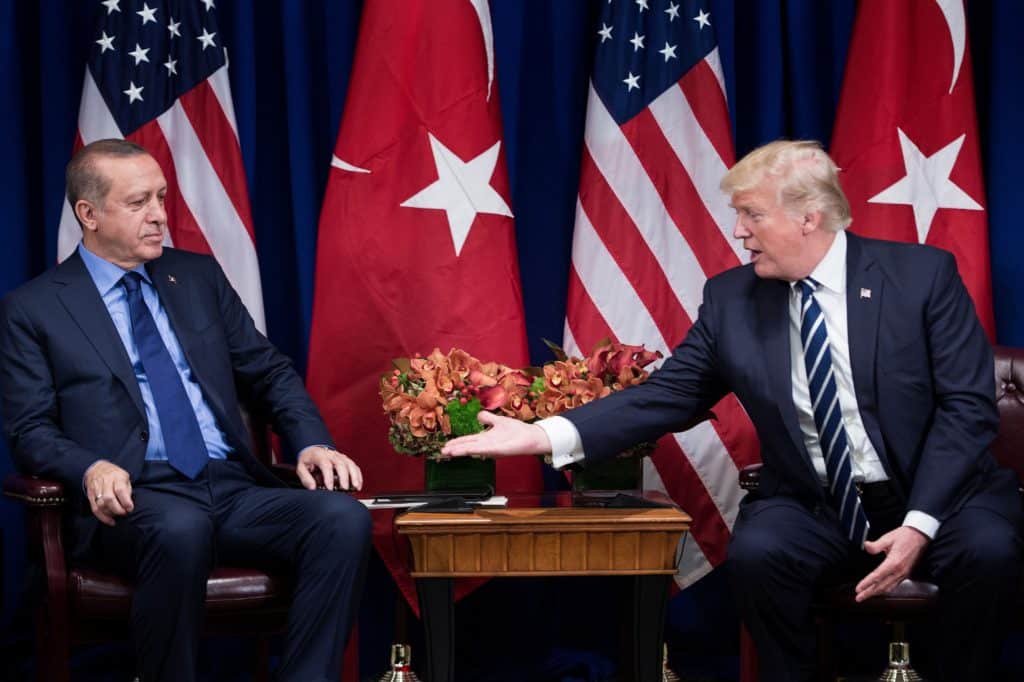
by Aykan Erdemir| www.fdd.org
A Turkish court on June 11 convicted Metin Topuz, a Turkish national and liaison officer for the U.S. Drug Enforcement Administration at the U.S. Consulate General in Istanbul, to eight years and nine months in prison on baseless charges of aiding an armed terror organization. Topuz is just the latest victim of Turkish President Recep Tayyip Erdogan’s hostage diplomacy, but he will not be the last if Washington continues to grant impunity to Turkey’s Islamist strongman.
Turkish prosecutors have brought spurious and politically motivated charges against some 50 individuals with ties to the United States and the European Union, including citizens, permanent residents, and employees, since Turkey’s failed coup attempt in 2016. Borrowing from Tehran’s hostage-taking playbook, Erdogan has used these prisoners as bargaining chips to extract concessions from Turkey’s U.S. and European treaty allies in NATO.
Erdogan’s highest-profile victim, American pastor Andrew Brunson, spent almost two years in pre-trial detention on farcical charges of terrorism, coup-plotting, and espionage. The Turkish president first offered to trade Brunson for Reza Zarrab, the ringleader of Iran’s sanctions-evasion network arrested by U.S. authorities in March 2016, and then for Fethullah Gulen, Erdogan’s former-ally-turned-archnemesis residing in Pennsylvania. Similarly, the Turkish president tried to trade German national Deniz Yucel, the German daily Die Welt’s Turkey correspondent, who was arrested in February 2017 on charges of spreading terrorist propaganda. Erdogan reportedly offered to release Yucel in exchange first for Berlin’s extradition of two Turkish generals and then for the unblocking of German arms exports to Turkey.
Other U.S.-affiliated individuals held hostage by Erdogan over the course of the last four years include Turkish-American dual citizens Ismail Kul, a chemistry professor at Widener University, and Serkan Golge, a NASA scientist, along with two U.S. consular employees, Hamza Ulucay and Nazmi Mete Canturk. Turkey released Kul and Golge in early 2019, after 17 months and 34 months of imprisonment, respectively. Yet Ankara still prevents both scholars from returning to the United States, which prompted the Committee of Concerned Scientists to pen a letter to President Donald Trump in December 2019, urging him to assist Kul and Golge “in any way possible so they may … get back to their lives.” The two consular workers – Ulucay, released in January 2019 after 18 months in prison, and Canturk, freed from house arrest in June 2018 – are similarly banned from leaving Turkey.
Eric Edelman, former U.S. Ambassador to Turkey, and Jake Sullivan, former national security adviser to Vice President Joe Biden, observe that the U.S. administration’s “lack of clear messaging has only reinforced Erdogan’s conviction that the United States will not meaningfully challenge him.” Similarly, Henri Barkey, former member of the State Department Policy Planning Staff, warns that a “U.S. failure to show that it stands by its people will cripple the State Department’s ability to represent America overseas.”
To push back against Erdogan’s hostage diplomacy, Senator Roger Wicker (R-MS), co-chairman of the U.S. Helsinki Commission, introduced a bill with bipartisan support, S.1075, the Defending United States Citizens and Diplomatic Staff from Political Prosecutions Act of 2019, which would require the president to impose sanctions on all senior Turkish officials responsible for the wrongful detentions of locally employed staff and citizens. In a Washington Post op-ed last year, Sen. Wicker warned that any negotiation over the fate of U.S. hostages “would only reward Erdogan’s bad behavior,” and that “[a]s with Brunson, only stiff political and economic pressure will work.” In its 2020 Annual Report, the U.S. Commission on International Religious Freedom recommended passing S.1075 and “the imposition of sanctions on responsible Turkish officials.”
Secretary of State Mike Pompeo issued a statement on June 11 noting that the United States is “deeply troubled” by the conviction of Topuz, a sentiment reiterated in tweets expressing “deep disappointment” from the U.S. Embassy in Ankara. Al-Monitor Senior Correspondent Amberin Zaman rightly called this a “muted response” that will strengthen Erdogan’s conviction that Trump will “continue to leave Turkey off the hook.” Unless Washington makes clear to Erdogan that there will be serious consequences for hostage diplomacy, the list of victims will only continue to grow.
 Aykan Erdemir
Aykan Erdemir
Turkey Program Senior Director
Aykan Erdemir is a former member of the Turkish parliament and a senior fellow at the Foundation for Defense of Democracies (FDD), where he also contributes to FDD’s Center on Military and Political Power (CMPP). For more analysis from Aykan and CMPP, please subscribe HERE. Follow him on Twitter @aykan_erdemir. Follow FDD on Twitter @FDD and @FDD_CMPP. FDD is a Washington, DC-based, nonpartisan research institute focusing on national security and foreign policy.